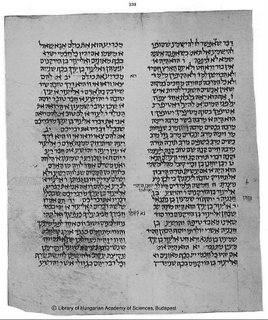In the kedushah part of the Shemoneh Esreh prayer, there is a word that can be pronounced as either ve-shivchakhah or u-shevach'kha. While the former seems to be more standard, and is how it is vocalized in most prayer books, the latter is becoming more common as the practices of the Vilna Gaon become more popular. What is the history behind it?
R. Yosef Kimchi, father of the Radak, wrote in his Sefer Ha-Zikaron (quoted by many, including Dr. Seligmann Baer in his Siddur Avodas Yisrael p. 90):
Those who say "u-shevach'kha" have strayed from the path of intelligence. Rather, it is ve-shivchakhah...This seems to imply that it was not uncommon in his time for people to pronounce it u-shevach'kha, although most people pronounced it ve-shivchakhah. If it were otherwise, his objection would certainly have been worded differently.
R. Eliyahu Ashkenazi the Grammarian (I don't know who he is), in his analyses of Radak's Sefer Ha-Shorashim (printed in the back of my edition of Sefer Ha-Shorashim, sv. Sh.B.Ch.), quotes R. Yosef Kimchi but then points out that this seems to be contradicted by vowelizations in the Mishnah. Specifically, Avos 2:8 reads in his editions "hu hayah moneh sh'vachan". This seems to support the second pronunciation.
I once had a disagreement with Dr. Haym Soloveitchik over how to pronounce a word in a Mishnah, and I brought a Ra'avad to prove my point (regarding tapu'ach/tepho'ach in Avodah Zarah 55a). He responded that he knows I can look up a Ra'avad; he wants me to look it up in historical sources (he implied that he would give different direction to someone with a more academic background). Where should I turn next?, he asked me. The answer was the vocalized Kaufman manuscript of the Mishnah (which ended up supporting my and the Ra'avad's pronunciation). [UPDATED:] On Avos 2:8, the Kaufman manuscript vocalizes the word as sh'vachan, supporting R. Eliyahu Ashkenazi's position. Although it has an odd shiv' before the word sh'vachan, which might indicate that both are legitimate.
R. Aryeh Leib Gordon, in his Iyun Tefillah commentary (published in Siddur Otzar Ha-Tefillos), argues for the pronunciation of u-shevach'kha:
The word "shevach/sh'vach" does not appear in Scripture, either independently or connected [to another word], and we have no tradition on its proper pronunciation. Its existence is only in the language of the Talmud and the prayers. When we have no certain way to determine the correct pronunciation of such words, we must listen to the pronunciation of the people who use [these words]. We hear that anyone involved in the Talmud in all countries of the dispersion -- from Ashkenazim and Sephardim to those in the east and west, and Yemenites -- all say "One should always prepare sh'vacho of God and afterwards pray" (Berakhos 116a), "It is forbidden to recite bi-shvachan (Sotah 42b)... Since the long vowel is pronounced quickly, it sounds like a short vowel [i.e. a pasach rather than a kamatz]... But we never heard anyone in any of these places say "shevach", "shivcho", or "shivchan"... Therefore I say that the pronunciation of the Vilna Gaon is correct and should be accepted...[UPDATED:] It seems to me that the testimony of the Kaufman manuscript indicates that both pronunciations are legitimate. (click on this image to enlarge it)

It is worth noting that in the Yishtabach blessing we recite "shir u-sh'vachah", which supports the Vilna Gaon's pronunciation, but elsewhere in the blessings prior to the Shema on Shabbos we recite "shevach".
 10:12 PM
10:12 PM
 Gil Student
Gil Student